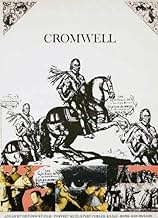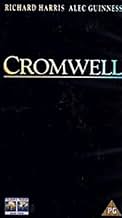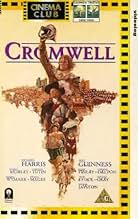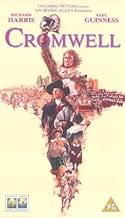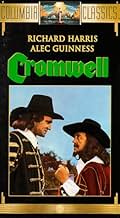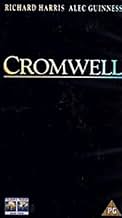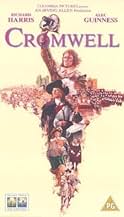Cromwell
- 1970
- Tous publics
- 2h 19m
Puritan statesman Oliver Cromwell leads England in a civil war against the absolutist and Catholic-sympathetic King Charles I.Puritan statesman Oliver Cromwell leads England in a civil war against the absolutist and Catholic-sympathetic King Charles I.Puritan statesman Oliver Cromwell leads England in a civil war against the absolutist and Catholic-sympathetic King Charles I.
- Won 1 Oscar
- 2 wins & 5 nominations total
- Director
- Writer
- All cast & crew
- Production, box office & more at IMDbPro
Featured reviews
Such a career deserves a careful movie. CROMWELL is not that film. It does do well in showing King Charles I (Alec Guinness) as a untrustworthy individual (though one driven to such actions because of his need to maintain his rights as monarch). It does make one serious howler regarding Charles I and his trial for treason. Charles may have been a liar and betrayer at times - but Sir Edward Hyde (who was a leading supporter of his, and would be a statesman in his son's reign and the father-in-law of the future James II) did not testify at Charles's trial as a witness for the prosecution.
Such glaring errors are frequent in the movie (for example, Prince Rupert was not dismissed so callously by his uncle King Charles - Rupert was a very fine cavalry leader, and would remain a fixture in English society when Charles II was restored). The subtle acting of Guinness is not matched by Harris, who rants and raves throughout the film - even in the closing moments talking about his intentions to create better schools and laws. Charles and Cromwell are two fascinating characters, and both deserve a better film than this as the sole film about the English Civil Wars (except for Vincent Price's THE CONQUEROR WORM) to come out.
Like the many tellings of the story of Mary Tudor and Mary Stuart which have them in climatic meeting, we have Oliver Cromwell and Mary Stuart's grandson, Charles I meeting not once, but several times. They too never met, but the story demands it.
In point of fact Oliver Cromwell was a minor figure in the war between the Crown and Parliament until the Parliamentary Army lost a series of battles and looked like they were going down for the count. It was at that point that Cromwell emerged as a military leader. It turned out that this previously obscure member of Parliament who had no previous military training had a natural genius for warmaking. He turned that army around and eventually Parliament won.
Cromwell could have been George Washington at this point and retired to the farm, but he used his prestige and not as reluctantly as this film shows to make himself the military dictator of Great Britain with the title of Lord Protector.
The experience of Cromwell's reign scarred the English body politic for generations and to a large degree the American one as well. The whole struggle over which interpretation of Christianity would hold sway was something all of the ancestors of the American founding fathers had to deal with. That's when the idea came to them to have no established religion in America. Cromwell's large standing Ironsides Army enforcing his dictatorship led to a positive mania about no standing armies, no quartering of troops and even the right to bear arms. All this because of a collective memory of the Lord Protector.
Richard Harris is a lean and mean Cromwell who keeps saying he just wants to go back to the farm, but somehow winds up grabbing for more power. Alec Guinness is the perfect conception of that luckless monarch Charles I. Please note the relationship between Guinness and Queen Henrietta Marie played by Dorothy Tutin. Two things should be remembered there. First Henrietta Marie is the sister of Louis XIV of France, a monarch with considerable more power than Charles has. Note how Tutin is constantly berating Guinness for not standing up to the Parliament. He does and see where it gets him. Secondly Charles I is one of the very few English monarchs with no royal paramours. He and the Queen were actually in love and he knew her advice was from the heart if it proved disastrous.
Please note a couple of other good performances, Timothy Dalton as Prince Ruppert of the Rhine, Charles's nephew from Germany who actually was a whole lot smarter than he's shown here. And Robert Morley as the Earl of Manchester, one of Cromwell's rivals in the Parliamentary camp.
Oliver Cromwell died in 1558 quite suddenly and within two years the Stuart Monarchy was restored under Charles II, oldest son of Charles I and Henrietta Marie. The collapse of the Protectorate is a subject that English historians have some raging debates over. It was very much like the collapse of the Soviet Union in our time. The collapse of the Protectorate and the Restoration of the Stuarts was filmed in Douglas Fairbanks Jr.'s The Exile and really needs an up to date treatment.
Cromwell as a film is magnificently photographed and directed and actually won an Oscar for costume design. But the flaws in the story line are too many and don't use this film as Cliff's notes kids.
Alec Guiness's king is impressive and his relationship with the catholic queen should have been more developed .Dame Dorothy Tutin's rendering is subtle and she makes all her scenes count.There is also Robert Morley and Timothy Dalton who give strong support.
Queen Henrietta took refuge in France and her daughter Henriette married the king Louis XIV 's brother ,"Monsieur" .Sadly she was to pass away at a very early age probably of peritonitis(few historians still speak of poisoning).
"Cromwell" ,which I saw when it was released ,has stood the test of time quite well,thanks to all these wonderful actors.In his own way,Cromwell was an incorruptible person ,ahead of his time,who predates Robespierre .The fact that he substituted a dictatorship for another one does not ruin his main revolutionary idea:a king is not infallible, the absolute monarchy means tyranny.A century and a half later ,minister Turgot told Louis XVI :"do not forget Charles the first,Sire!"
I also feel that for a film to be educational and informative it has to be accurate and unfortunately Cromwell is never going to win any awards in the 'what really happened' category.
Despite these inaccuracies, the film does give us a general idea of what went on in the England of the 1640's so it still has the power to be enjoyable.
Alec Guinness steals the entire film with the only accurate portrayal in the movie as Charles I. The stuttering Scot who believes in the divine right of Kings. A man who looks upon Parliament as a challenge to his authority over the people, and a head of a protestant state wrestling with his own strong catholic leanings and sympathies.
Richard Harris is outstanding and brilliant, but portrays Cromwell as someone he most certainly wasn't. As an Irishman, it amazes me what ever persuaded him to take on the role. With Cromwell being the most hated Englishman in Irish history, I was surprised he didn't portray him as an evil oppressor and murderer complete with handlebar moustache, top-hat and cape accompanied by Hammond organs and loud hissing sounds from the audience.
Instead Harris' Cromwell is so nice and decent, honourable and just that by movies end he would have been welcomed at any dining table in County Cork.
Cromwell's belief was that Parliament runs the country and the people run the Parliament (reminder for Tony Blair!!!) The system we have today. However during his time as head of a republic state, he seemed to have forgot this and went his own way on nearly everything despite what the people wanted (remind you of anyone Tony Blair!!!)
So again inaccuracies rain on what is on the whole a very good parade.
The battle scenes also fail to excite as they are not filmed on the dramatic scale needed to have done them justice. In fact sometimes they are reminisent of Monty Python's reenactment of the Battle of Pearl Harbour by the Batley Towns-women's Guild.
Watch this film and enjoy it as I did, but I beg of you, don't use it as a basis for a factual thesis in your History Degree...you will fail big time.
Spectacular historical melodrama with magnificent acting , wonderful locations , glamorous gowns and attention to period detail . In the movie there are historic events , intense drama, and Richard Harris as well as Alec Guinness give excellent performances , though Harris as a coldly unsympathetic Briton is usually shouting and overacting . Great acting by secondary players : Frank Finlay , Patrick McGee ,Dorothy Tutin, Robert Morley , Geoffrey Keen, Timothy Dalton , Michael Jayston , Douglas Wilmer , Charles Gray , among others . The film is a bit boring for parliament speeches but in the battles (Naseby 1645) is more entertaining , being splendidly staged . The final version of Cromwell at one stage was 180 minutes long, but it was cut down to 141 minutes, deleting a number of featured roles in the process .
The film is appropriately atmospheric and based on real deeds . First-class production design and sets by John Stoll are outstanding , including Oscar winning costume design by Novarese . In fact , close to 5.000 costumes were made , and 17.0000 separate ítems or props found or realized . Heavy make-up was utilized ; in addtion , thousands of wigs from all around the world. Glowing cinematography in Panavision by Geoffrey Unsworth and evocative as well as rousing musical score by Frank Cordell . Good direction by Ken Hughes . The motion picture will appeal to history's buffs . Rating: 7,5/10 , above average .
Did you know
- TriviaWhen writer / director Ken Hughes said to Richard Harris that no self-respecting Irishman should ever play Oliver Cromwell, Harris laughed.
- GoofsCromwell was not one of the Members of Parliament named for arrest in the King's warrant. Cromwell was not present in Parliament at the time the King and his troops entered the House of Commons. The scene of he alluding that The King is a traitor actually happened with John Elliott some ten years prior.
- Quotes
King Charles: I do swear that hold this England and its laws dearer to my heart than any here. But gentlemen, if you would reduce me to a figurehead - a puppet king, manipulated by parliament - how then would I serve my country? What manner of king would I be?
Oliver Cromwell: I am persuaded, Your Majesty, that England must move forward to a more enlightened form of government, based upon a true representation of a free people. Such an institution is known as... "democracy", sir.
King Charles: Democracy, Mister...
Oliver Cromwell: Cromwell, sir.
King Charles: Democracy, Mister Cromwell, was a Greek drollery based on the foolish notion that there are extraordinary possibilities in very ordinary people.
Oliver Cromwell: It is the ordinary people, my lord, who would most readily lay down their lives in defense of your realm. It is simply that "being ordinary", they would prefer to be asked - and not told.
- ConnectionsFeatured in 52nd Annual Academy Awards (1980)
Details
- Release date
- Countries of origin
- Language
- Also known as
- Cromwell, hombre de hierro
- Filming locations
- Production companies
- See more company credits at IMDbPro
Box office
- Budget
- £3,750,000 (estimated)
- Runtime
- 2h 19m(139 min)



